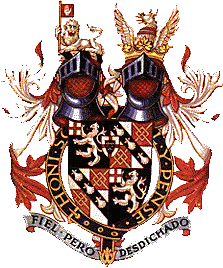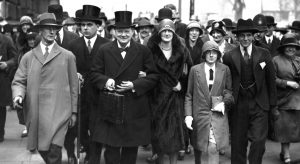
Reference
The Fine Art of Selective Quoting

May 15, 2009
Richard M. Langworth
Editor, Finest Hour
Issue 139, Summer 2008.
 In this issue we do something we’ve never done before. We move “Books, Arts & Curiosities” to the “front of the book.” This is not to give undue attention to Nicholson Baker’s and Pat Buchanan’s simultaneous attack-books, but to equip our readers with facts that support Churchill’s honor, judgment and good name—and to demonstrate how easily history may be bent.
In this issue we do something we’ve never done before. We move “Books, Arts & Curiosities” to the “front of the book.” This is not to give undue attention to Nicholson Baker’s and Pat Buchanan’s simultaneous attack-books, but to equip our readers with facts that support Churchill’s honor, judgment and good name—and to demonstrate how easily history may be bent.
A problem illustrated by Pat Buchanan’s Churchill, Hitler, and the Unnecessary War is the rampant use of selective quotes. No animus toward the author: “I like a man who grins when he fights,” as Churchill said. But selective quotations edited to distort the facts and to fit a predetermined mindset are out of bounds.

2025 International Churchill Conference
To establish Churchill’s “lust” for World War I, for example, Buchanan quotes him on 28 July 1914: “Everything tends towards catastrophe & collapse. I am interested, geared up and happy. Is it not horrible to be built like that?…” (28). But he omits the rest of that passage: “…The preparations have a hideous fascination for me. I pray to God to forgive me for such fearful moods of levity. Yet I w[oul]d do my best for peace, and nothing w[oul]d induce me wrongfully to strike the blow.” (Winston S. Churchill, Companion Volume II, Part 3, published 1969, 1989.)
Again on 10 January 1915, he has Churchill exclaiming: “My God! This, this is living History. Everything we are doing and saying is thrilling—it will be read by a thousand generations, think of that! Why I would not be out of this glorious delicious war for anything the world could give me (eyes glowing but with a slight anxiety lest the word ‘delicious’ should jar on me)” (66).
The latter is pure hearsay from the notoriously waspish Margot Asquith, but assume he said it. To suit his thesis, Pat trims the rest of what Margot reported: “…I say don’t repeat that I said the word ‘delicious’—you know what I mean…..” (Winston S. Churchill, Companion Volume III, Part 1, published 1972, 400.)
Possessed of the words deleted from Margot’s idle chit-chat, one might ask what WSC meant by “you know what I mean”? Did he assume Margot knew he realized what barbarity war was—that he had been warning of the apocalyptic nature of a European war since attacking the Army Estimates in 1903?
I searched in vain amid Pat’s collection of lusty war quotes for contrary expressions—and there are many. Take Churchill’s 1909 remark after watching German Army maneuvers: “Much as war attracts me & fascinates my mind with its tremendous situations—I feel more deeply every year—& can measure the feeling here in the midst of arms—what vile & wicked folly & barbarism it all is” (Winston S. Churchill, Companion Volume II, Part 2, published 1969, 912). The author does include an early 1900s remark about the dangers of a European war, but only to imply that Churchill had changed his tune by 1914. Nowhere do we read exculpatory evidence, such as Churchill’s 1911 proposal for an Anglo-German “naval holiday” or, at the eleventh hour, of a peace conference attended by all the Heads of State of Europe.
Then there is Hitler, on whom Pat has been industrious. Under his photo we read: “‘If our country were defeated, I hope we should find a champion as indomitable to restore our courage and lead us back to our place among the nations.’ —Churchill on Hitler, 1937.” This sentence has often been culled out to be misunderstood. Here is the full passage (Step by Step, 1947 edition, 158). Draw your own conclusions:
To feel deep concern about the armed power of Germany is in no way derogatory to Germany. On the contrary, it is a tribute to the wonderful and terrible strength which Germany exerted in the Great War, when almost single-handed she fought nearly all the world and nearly beat them. Naturally, when a people who have shown such magnificent military qualities are arming night and day, its neighbours, who bear the scars of previous conflicts, must be anxious and ought to be vigilant. One may dislike Hitler’s system and yet admire his patriotic achievement. If our country were defeated I hope we should find a champion as indomitable to restore our courage and lead us back to our place among the nations. I have on more than one occasion made my appeal in public that the Führer of Germany should now become the Hitler of peace.
All of which shows yet again that you can use Churchill’s words, vacuumed like a gigantic Hoover and offered without ellipses by the faithful Martin Gilbert, to prove anything. You only have to preselect and edit the right ones. —RML
Subscribe
WANT MORE?
Get the Churchill Bulletin delivered to your inbox once a month.





